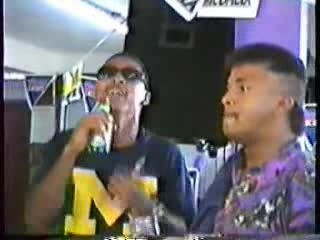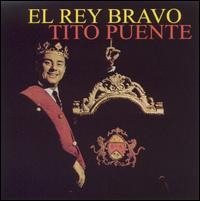
In popular music, a cover version, cover song, remake, revival, or simply cover, is a new performance or recording by a musician other than the original performer or composer of the song. Originally, it referred to a version of a song released around the same time as the original in order to compete with it. Now, it refers to any subsequent version performed after the original.

Several styles of the traditional music of Venezuela, such as salsa and merengue, are common to its Caribbean neighbors. Perhaps the most typical Venezuelan music is joropo, a rural form which originated in the Venezuela, or Orient coast since the colony.

"Unchained Melody" is a 1955 song with music by Alex North and lyrics by Hy Zaret. North wrote the music as a theme for the prison film Unchained (1955), hence the song title. Todd Duncan sang the vocals for the film soundtrack. It has since become a standard and one of the most recorded songs of the 20th century, most notably by the Righteous Brothers in 1965. According to the song's publishing administrator, over 1,500 recordings of "Unchained Melody" have been made by more than 670 artists, in multiple languages.

Reggaeton, also known as reggaetón and reguetón, is a music style from Puerto Rico that was influenced by Reggae en Español in Panama, Hip Hop, Dancehall, Bomba and Plena. It has evolved from dancehall and has been influenced by American hip hop, Latin American, and Caribbean music. Vocals include rapping and singing, typically in Spanish.
Crossover is a term applied to musical works or performers who appeal to different types of audience. This can be seen, for example, when a song appears on two or more of the record charts which track differing musical styles or genres. If the second chart combines genres, such as a "Hot 100" list, the work is not a crossover.

"Medley: Aquarius/Let the Sunshine In " is a medley of two songs written for the 1967 musical Hair by James Rado and Gerome Ragni (lyrics), and Galt MacDermot (music), released as a single by American R&B group the 5th Dimension. The song spent six weeks at number one on the US Billboard Hot 100 pop singles chart in the spring of 1969 and was eventually certified platinum in the US by the RIAA. Instrumental backing was written by Bill Holman and provided by session musicians commonly known as the Wrecking Crew. The actual recording was novel at the time, being recorded in two cities, Los Angeles and Las Vegas, and being mixed down to a final version later.
"You're Just in Love" is a popular song by Irving Berlin. It was published in 1950 and was first performed by Ethel Merman and Russell Nype in Call Me Madam, a musical comedy that made its debut at the Imperial Theatre in New York City on October 12 that year. The show ran for 644 performances. Ethel Merman also later starred in the 1953 film version. Theatre lore has it that Berlin wrote the song one night after Call Me Madam was not doing well in tryouts. The second act of the show was lacking. "What I'd like to do is a song with the kid ," Merman said. So, Berlin went to his room and later produced the counterpoint song. When Berlin played the song for Merman, she said, "We'll never get off the stage." Reportedly, Berlin played the song for Russell Nype first, but admonished him not to admit he did so because it would infuriate Merman.
Luis María Frómeta Pereyra most known as Billo Frómeta was a Dominican orchestra conductor, arranger and composer Billo's compositions achieve international fame, and those dedicated to Caracas, where he married several times and raised a family, made him the most beloved of composers. He always included Dominican Merengue and mangulinas in his recordings.
"Somos Novios" is a song first recorded by Mexican songwriter Armando Manzanero in 1968. Originally a French song "J'ai le mal de toi", different versions with unrelated lyrics in different languages have been written and recorded. Perry Como recorded an English version of "Somos Novios" with original English lyrics titled "It's Impossible", which was a top 10 hit in the US and the UK.

"Oye Cómo Va" is a 1962 cha-cha-chá by Tito Puente, originally released on El Rey Bravo. The song achieved worldwide popularity in 1970, when it was recorded by American rock group Santana for their album Abraxas. This version was released as a single in 1971, reaching number 13 on the Billboard Hot 100, number 11 on the Billboard Easy Listening survey, and number 32 on the R&B chart. The block chord ostinato pattern that repeats throughout the song was most likely borrowed by Puente from Cachao's 1957 mambo "Chanchullo", which was recorded by Puente in 1959.

VH1 was a European music television channel owned by ViacomCBS Networks EMEAA. It played a wide variety of music programs on a daily or weekly basis, and various VH1 original series.
"Para Vigo me voy", known in English as "Say Si Si", is a popular song written in 1935 by Cuban composer Ernesto Lecuona with lyrics by Francia Luban and Al Stillman. Early bands to record the song include Xavier Cugat's orchestra (1935) and Lecuona Cuban Boys (1937). The song was copyrighted in the United States in 1940. It became a hit in the US when it was recorded by The Andrews Sisters and Glenn Miller in 1940, and The Mills Brothers in 1953.
Los Melódicos is a Latin dance band from Venezuela which plays a mix of tropical rhythms. The orchestra was assembled by Billo Frómeta in Caracas in July 1958. They made their debut through a local radio station on July 15, 1960. Frómeta sold the orchestra to Renato Capriles, who was acting as an owner as Billo was suspended by the Venezuelans musicians union. Renato took over in 1960 and Los Melódicos has been directed by him since then. The orchestra was voted by a Caracas journalist association as the best Venezuelan orchestra that year.

"En mi Viejo San Juan" is a composition by Puerto Rican composer and singer Noel Estrada. Interpreted by numerous singers and translated into various languages, the song is "widely known around the world". There are musical interpretations in German, English and French. Over 1,000 distinct recordings of the song have been made worldwide.
Pregón, a Spanish word meaning announcement or street-seller's cry, has a particular meaning in both Cuban music and Latin American music in general. It can be translated as a song based on a street-seller's cry or a street-seller's song.
"Eviva España" is a Belgian pop song, originally written by composer Leo Caerts and lyricist Leo Rozenstraten in Dutch. It was first recorded and performed by the Belgian singer Samantha in 1971. Musically, the song has a distinctly Spanish-sounding pasodoble style. The theme of the lyrics is anticipation of a holiday in Spain.
"Gracias a la vida" is a song written, composed and performed by Chilean Violeta Parra, one of the artists who was part of the movement and musical genre known as the Nueva Canción Chilena. Parra composed "Gracias a la vida" in La Paz in 1966. It was included on Las Últimas Composiciones, the last album Parra published before committing suicide in 1967. The song is one of Parra's most renowned. It is performed throughout the world and remains one of the most covered Latin American songs in history.
American singer Selena released twenty-four official singles, seven promotional singles. Her career began as the lead vocalist of Los Dinos in 1980. Her albums with Los Dinos on indie labels failed to achieve any chart success. In 1987, her remake of Ritchie Valens' "La Bamba" peaked at number 19 on the United States Billboard Hot Latin Songs chart, her first entry. She signed with EMI Latin nine years later as a solo artist though her band continued to tour with her. Selena appeared on "Buenos Amigos" with Salvadoran singer Álvaro Torres. The track peaked at number one on the U.S. Hot Latin Songs chart in 1991, the singer's first number one song. Subsequent singles, "Baila Esta Cumbia" and "Como la Flor", became popular songs on Mexican radio, with "Como la Flor" launching the singer's career in that country. "Como la Flor" peaked at number six on the Hot Latin Songs chart, despite popular culture claims that it was the singer's first number one single. The track has charted on the U.S. Regional Mexican Digital Songs list since its inception in 2010 and remains the singer's signature number and most popular recording.

The Muppets: An Original Walt Disney Records Soundtrack is a soundtrack album released by Walt Disney Records on November 22, 2011 for the musical comedy film The Muppets. The soundtrack features five original songs, four re-recordings and remasterings of popular Muppet songs, two cover versions of existing songs, two standalone songs, and fifteen dialogue tracks. It also features the song "Man or Muppet", which won the Academy Award for Best Original Song. The soundtrack was also nominated for Best Compilation Soundtrack for Visual Media at the 55th Grammy Awards.
Latin music is a term used by the music industry as a catch-all arbitrary category for various styles of music from Latin America, Spain, Portugal, and the United States inspired by older Latin American, Spanish and Portuguese music genres, as well as music that is sung in the Spanish and/or Portuguese language.






